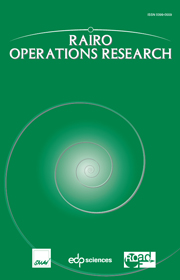Article contents
A polarized adaptive schedule generation scheme for theresource-constrained project scheduling problem
Published online by Cambridge University Press: 15 May 2012
Abstract
This paper presents a hybrid schedule generation scheme for solving theresource-constrained project scheduling problem. The scheme, which is called the PolarizedAdaptive Scheduling Scheme (PASS), can operate in a spectrum between two poles, namely theparallel and serial schedule generation schemes. A polarizer parameter in the rangebetween zero and one indicates how similarly the PASS behaves like each of its two poles.The presented hybrid is incorporated into a novel genetic algorithm that neverdegenerates, resulting in an effective self-adaptive procedure. The key point of thisgenetic algorithm is the embedding of the polarizer parameter as a gene in the genomesused. Through this embedding, the procedure learns via monitoring its ownperformance and incorporates this knowledge in conducting the search process. Thecomputational experiments indicate that the procedure can produce optimal solutions for alarge percentage of benchmark instances.
- Type
- Research Article
- Information
- Copyright
- © EDP Sciences, ROADEF, SMAI, 2012
References
- 5
- Cited by


